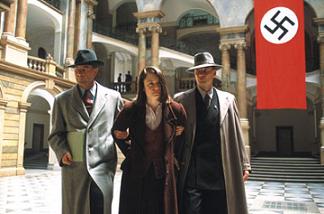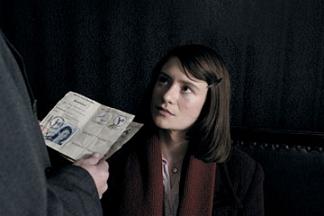

In late February 1943, Nazi Germany executed three members of White Rose, a Nazi resistance party. Twenty-one year old Sophie Scholl was one of those executed, and Sophie Scholl: The Final Days, traces the last six days of her life. This is a gripping film that is racking up awards and nominations world-wide, including Best Film and Actress at the German Academy Awards, an a nomination for Best Foreign Film for the Academy Awards. All are well deserved, and even more astonishing is that director Marc Rothemund (Just the Two of Us) and screenwriter Fred Breinersdorfer aimed for as much historical accuracy as possible. They used actual interrogation transcripts for much of the script.
Scholl (Julia Jentsch, The Edukators, Downfall) and her brother Hans (Fabian Hinrichs, Gun-shy) are arrested for distributing subversive pamphlets on a university campus. Rothemund begins Sophie Scholl begins on a tense note, with the Scholls and some other members of White Rose creating the pamphlets. It is very clear that what they are doing is extremely dangerous. They believe that Germany will lose, and the best way to minimize casualties is to surrender. The Scholls make their way to school, and while everybody is in class, they leave stacks of papers outside every classroom. It's a race against time, but they seem to finish just on time, and are about to escape amidst the crowd when somebody catches them.
At this point, Sophie Scholl is already harrowing and intense. It only gets worse, but now people can also appreciate the powerful performance from Jentsch. Much of the rest of the film consists of an interrogation from Robert Mohr (Gerald Alexander Held, Downfall, Before the Fall). The two face off in a large office. Mohr yells and stammers and accuses (but apparently initially thought she was innocent), and Scholl holds her ground and sticks to the story that she is innocent, regardless of how bellicose Mohr is. Even as evidence mounts against her, Scholl does not give way. She speaks calmly, rationally, and has an answer for every accusation thrown at her. It's a fascinating test of wills between the two; one a trained Nazi interrogator, the other an idealistic young woman.
Jentsch is the heart of this movie. Scholl has the courage and integrity to stand up for what she believes in despite the fact that it may come at the cost of her life. She calmly gives excuses to Mohr, until confronted with her brother's confession. At this point, she changes tactics, and tries to take the blame for everything. She ardently and rationally argues her points to a stubborn Mohr. Jentsch's performance is multilayered, centering on restraint. She looks calm on the outside, but the viewer knows that inside, she is scared for herself and her brother. As the days pass, her situation looks grimmer, and her demeanor begins to break down. Jentsch handles the gradual change well, becoming the emotional anchor for the film, and is the one who makes this film worthy of its nomination.